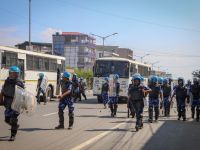The province of Quebec announced Wednesday it has developed a 59-point plan to battle radicalization of its residents, including a team to monitor social media and an anti-radicalization center to be established in Montreal.
The Canadian province has been a hot spot for radicalization – two soldiers killed in separate incidents last October were either from Quebec or lived there at some point.
And 10 youths arrested at Montreal’s Trudeau airport in May were attempting to board a plane to go to Turkey and Syria to fight for jihadists, according to the Royal Canadian Mounted Police. Their passports were confiscated but the teens have yet to be charged.
“Our plan seeks to prevent violent acts by people who have become radicalized, such as the ones [two soldiers killed] we witnessed last fall, and moreover, to stop young people from leaving the country to join extremist groups,” said Public Security Minister Lise Theriault as reported by the Canadian Press wire service.
Included are also plans to offer training to teachers and social workers on how to detect radicalization and what steps to take to deal with it, and to co-ordinate provincial agencies and police forces to tackle the problem.
The province will also build a $2 million anti-radicalization center in Montreal, the first of its kind in North America, said city Mayor Denis Coderre.
The center will offer counseling and psychological services to radicalized individuals and those who have been groomed to commit violent acts, he said.
“We will have interveners in the center to de-program (radicalized people) and work with them in a context of reintegration into society,” Coderre said.
Quebec also introduced two bills in the National Assembly on Wednesday. One is designed to give the Quebec human rights commission more powers to investigate hate speech and to create a public registry of those found guilty of spreading hate.
The other bill dealing with a “charter of values” contains a controversial measure that could force individuals to have their faces uncovered when receiving government services.
By Barry Ellsworth








